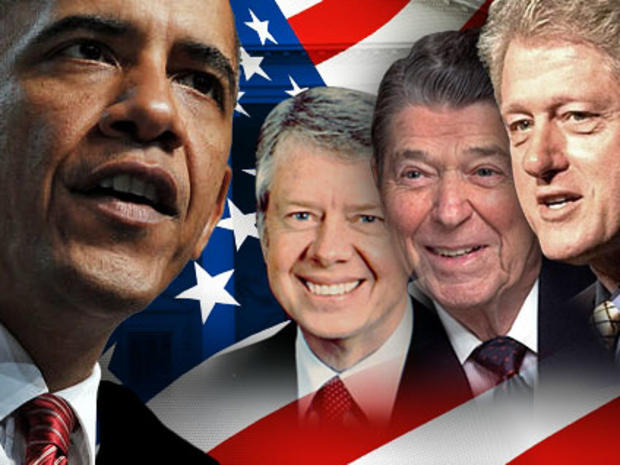Obama's Low Poll Numbers Mirror Past Presidents'
A year and a half into his presidency, and just months head of the midterm elections, President Barack Obama's approval rating is 44 percent, according to the latest CBS News Poll, conducted July 9-12. This rating matches his previous low from March of this year, and is down 24 points from his high of 68 percent reached in April 2009. So how does President Obama stack up against past presidents at similar points in their presidencies?
At 44 percent, Mr. Obama's approval rating is similar to those of Bill Clinton (42 percent) and Ronald Reagan (42 percent) at comparable times in their presidencies. Mr. Obama's rating is slightly higher than Jimmy Carter's (38 percent).
Like Mr. Obama, these past presidents were plagued by economic troubles early in their presidencies - and Mr. Clinton attempted to reform health care. During the summer of 1982, President Reagan was trying to cope with a national unemployment rate of over 9 percent -- similar to the job situation Mr. Obama confronts today.
As is traditionally the case, these three presidents -- Reagan, Clinton and Carter -- saw their party lose seats in the midterm elections during their first term. In 1994, during Clinton's presidency, the Democrats lost a net of 54 seats in Congress, paving the way for the "Republican Revolution".
However, for Presidents Reagan and Clinton, the country's economy slowly improved, their approval ratings crept up and both were re-elected, with Mr. Reagan winning by a landslide. President Reagan also benefited from a bit of a rallying effect when he sent U.S. troops into the Caribbean island of Grenada in the fall of 1983.
Things worked out differently for Jimmy Carter. In addition to a sluggish economy, President Carter faced an oil crisis as well as the American hostage situation in Iran and he was defeated by Mr. Reagan in 1980.
Both George W. Bush, and his father, George H.W. Bush, enjoyed high approval ratings a year and a half into their presidencies. In July 2002, George W. Bush's approval rating was 70 percent -- his rating had sky-rocketed after the attacks of September 11, 2001, and remained above 60 percent until mid-2003. Going against history, the president's party, the Republicans, actually gained seats in the congressional elections of 2002.
But the public's goodwill would eventually come to an end. Shortly after Mr. Bush was re-elected, Americans began to sour on the war in Iraq, and his ratings suffered. At no time during his second term in office would his approval rating reach 50 percent in CBS News Polls.
For Bush "41", the country rallied around him in the summer of 1990 as the U.S. deployed troops to Saudi Arabia amid Iraq's invasion of Kuwait - 66 percent approved of the job he was doing as president. His rating climbed even higher as the U.S. launched Operation Desert Storm in 1991 against Iraq. However, President George H.W. Bush's popularity was short-lived. As the economy took a nosedive, so did his approval ratings, and he lost re-election in 1992.
President Obama's current marks are considerably lower than those given to both John F. Kennedy (66 percent) and Dwight D. Eisenhower (75 percent), according to Gallup Polls. Both of these presidents were popular throughout their time in office.
History shows that the condition of the country's economy has been critical to the success and failure of many presidents. Speaking about the economy to a Ford assembly plant in Chicago on Thursday, Mr. Obama said, "It's going to take more time to heal from all the damage that was done. We are headed in the right direction."
It remains to be seen how long Americans can wait.
Jennifer De Pinto is manager of election and survey information for CBS News. Click here for more of her posts on the Hotsheet.
